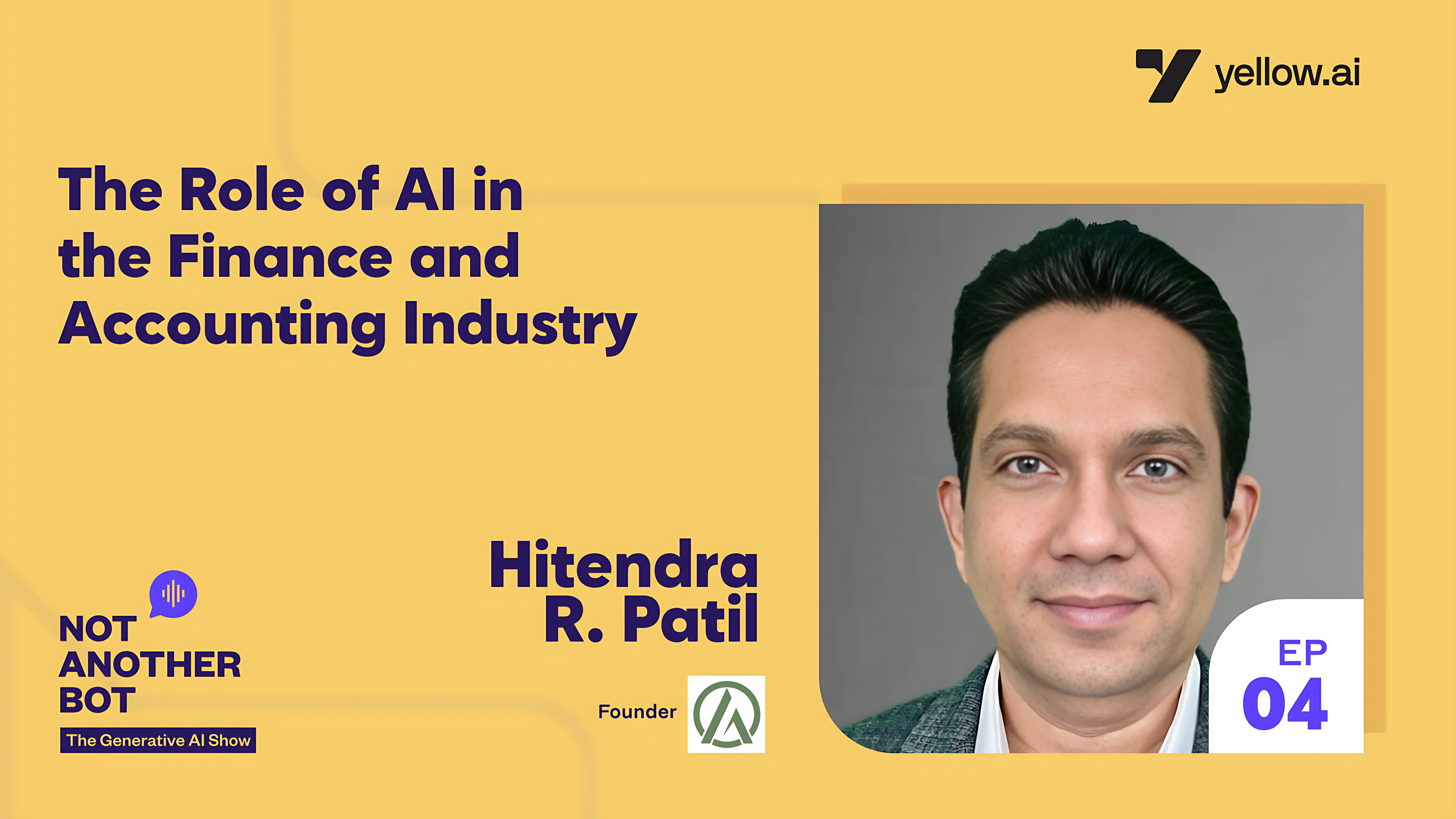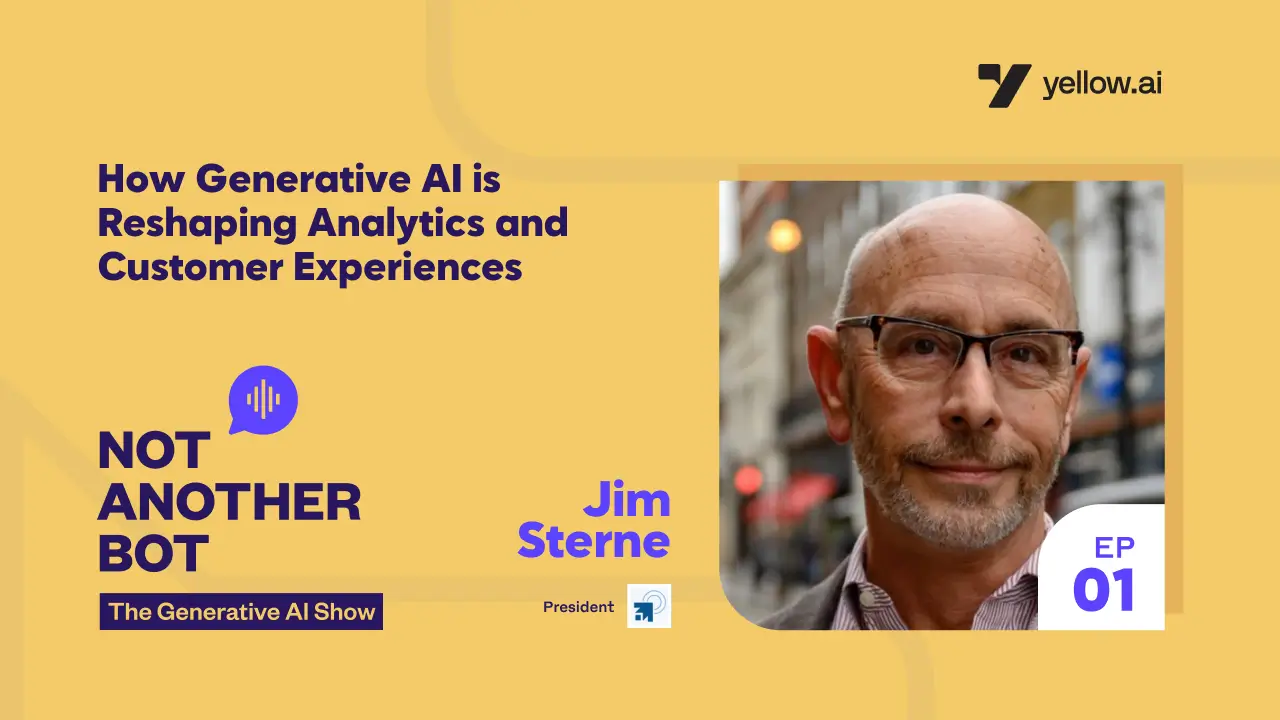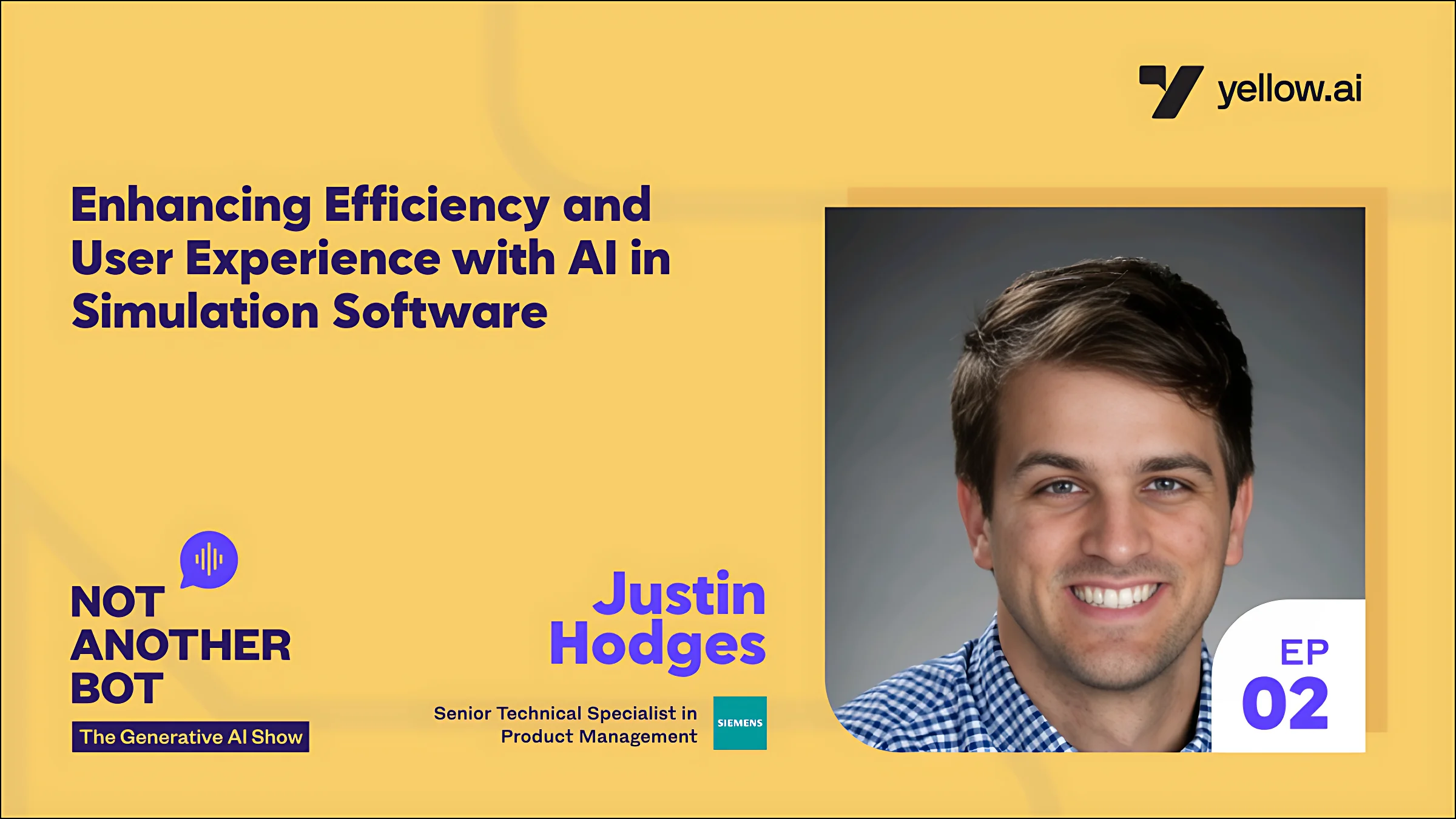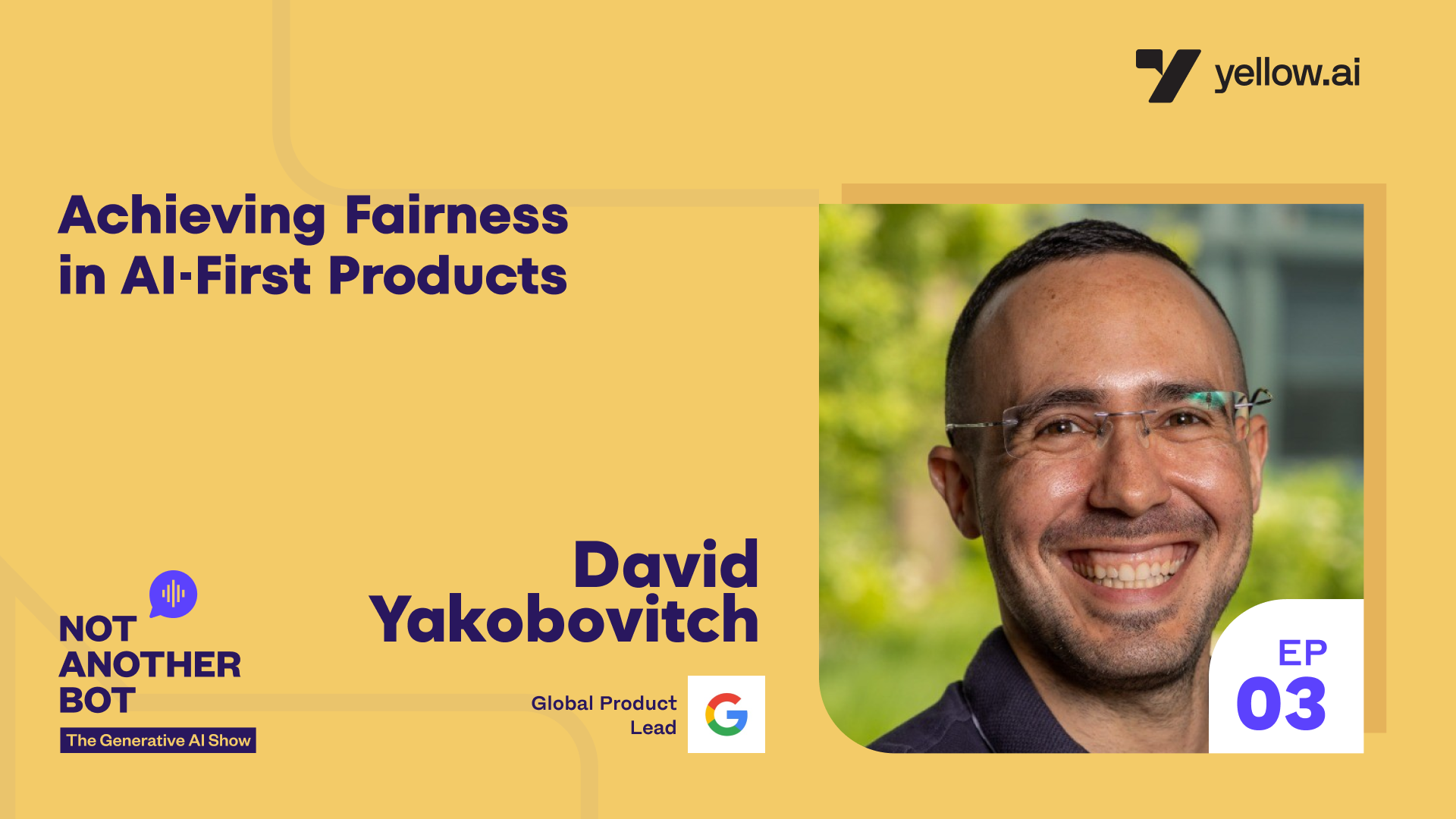Transcript
Tara Shankar – 00:00:03:
Generative AI takes the center stage. But is your enterprise still watching from the sidelines? Come on in, let’s fix that. This is Not Another Bot, the Generative AI show, where we unpack and help you understand the rapidly evolving space of conversational experiences and the technology behind it all. Here is your host, TJ. Good morning, good evening, good afternoon, wherever you are. Welcome to Not Another Bot, the Generative AI show. I’m your host, TJ, and joining me today is Hitendra Patil, founder of Accountaneur. Accountaneur offers consultancy and advisory services for Accounting, FinTech, and SaaS enterprises, as well as providing business growth training, guidance, and coaching to top-level executives and team members alike. Hitendra is also the author of multiple books, one of them being “Client Accounting and Advisory Services”. The other one is the “AI Accountants with an AI, The Essential Guide to the What, Why and How of AI for Accountants”. It’s a pretty important topic in the finance and FinTech industry. Welcome Hiten, super excited to be here.
Hitendra Patil – 00:01:12:
Thank you for having me. I’m so excited to be here as well.
Tara Shankar – 00:01:15:
Awesome. Alright, so first question for you, especially given the fact that you’re reading these books and I would love to know more about it. The first question for you is what’s factual? What’s the hype? And what’s practically realistic about AI and FinTech and Accounting right now?
Hitendra Patil – 00:01:30:
Okay, so to be on the same page, when we say we are talking about AI in relation to Accounting, we are not referring to just ChatGPT or Google Bard or anything of that sort. Those are just possibly the biggest shining stars in the AI galaxy, which is much bigger than those two stars. So with that in mind, AI in the sense of all-encompassing AI technology as it is invading the Accounting profession. So let’s look at what’s factual. Factual is pretty simple. Automation is already happening. Data analysis can be done more efficiently. Those are kind of real current applications that happen either within the Accounting software or outside of them using some of this ChatGPT kind of stuff. But there is a big divide there. What’s within and what’s outside those two worlds merging is difficult to ask really for accountants. The hype, if I have to pick full Automation, everything will be automated and accountants will lose their jobs and things like that. I don’t think that’s going to happen very soon. For one simple reason, AI, as you might know, it is all about data that is used to train the AI tools. So there is a world that exists outside of that data, and that’s the world of your clients. So you’re dealing with them, their ideas, their goals, aspirations, fears, everything is outside of that data. So how do you make these two worlds merge? You’re on that boundary like an immigration officer, right? So you’re trying to move things around. So full Automation, replacement of jobs is very, very difficult. That’s definitely the hype. Because accountants in general make very complex judgment calls based on lots of moving parts around, they’re not just within databases. What’s practically realistic? I would say data extractions, aggregations, cleaning the data as much as it is validated against certain rules and those kinds of things will become far better, far efficient now, practically. AI-curated data is also possible. You don’t define the rules so clearly. Based on the other rules that are existing, so what AI has learned, it can help reduce some of that work. Practically realistic is also in terms of audits instead of sample audits because of large data sizes. You tend to miss out on certain possible anomalies and intent of frauds and things like that. But with AI, it is very much likely to do audits, which means not just detecting frauds or mistakes, but actually preventing that is more likely with AI. Plus, what if analysis or predictive analysis, you can run those things much more easier than running them, let’s say, in Excel sheets. Because AI can literally scan through the entire database what it was trained on and bring insights that you might not have considered in those advisory services. So those are my takes on these three things.

AI-enabled audits not only help in detecting frauds or mistakes but actually help in preventing them.


Hitendra R Patil
Founder, Accountaneur

Tara Shankar – 00:04:29:
sense totally and I think the factual part certainly is something where the world needs to be more aligned to. The hype I think you know the more and more we go towards Automation. I think there will be at some point in time a world where we will see full Automation but to your point yeah it’ll take its own time to get there. There’s a lot of regulations you know considerations that needs to happen but I think there was definitely a need for that for sure but I think yeah well said. Cool another one just to kind of you know break the ice further. I think your introduction to modern AI I mean in your field when was that and what was your first impression of it?
Hitendra Patil – 00:05:04:
I think the first time I really sensed AI is making in roads was way back in when Google’s founders talked about a search engine that knows everything, not just what is required to be found, but also the context of what the user is trying to do. That was a hint towards AI. I started looking at AI, I started reading and things like that. My first direct interaction with the AI tool was with IBM Watson somewhere five, six years ago. And I was pretty much enamored by natural language query, sentiment analysis, and all those things that it was doing. And initially I thought, oh, what a cool thing. You just, you know, everything in that magic. But then I tested it myself at my home, trying to figure out what the heck it is. And then I figured, oh, you need to have a database that you need to train first, and then the magic happens. So then I got that introduced in my previous company, which was like a FinTech company offering Accounting and payroll software. So we used it for training the payroll customers database in terms of support. So we identified like a thousand common questions that a new user would ask and got the answers. And essentially it was like, whichever way the question is asked, it would still go and find. That was the magic for natural language processing. That helped quite a lot, reducing the incoming number of calls, the customer experience improved and things like that. But it was also like, you know, not necessarily the customers would know what to ask, depending upon their own competencies, knowledge and all that. So that was that gray area, which we had to keep refining, keep adding questions and things like that. So that was my thing. NLP, I had a different meaning in my mind at that time. Now it’s natural language processing.
Tara Shankar – 00:06:47:
Yes, and we do a lot of that in our company here, right? We are totally an AI-bought Automation organization. We have the platform and nothing like NLP and the advancement of Generative AI in that phase is just awesome. Well, that’s a good segue to the next part of our discussion, which is for what I could understand, looking at your profile, your journey, you have been yourself very customer-centric. And I would like to know, you know, given the focus that our industry have today, how can AI and especially Generative AI can help improve customer centricity in the FinTech and Accounting industry? I’ll be specific to your industry for now, but you please feel free to kind of talk and make it generic too. But that will be my sort of question to you that – how do you really want to bring that focus which you already have being customer-centric using AI and Generative AI?
Hitendra Patil – 00:07:38:
Great question. You know, I’m a keen student of human behavior sciences also. And when I saw that AI can do sentiment analysis, for example, you know, that’s a fantastic thing to segue into meaning. You’re getting so many calls and emails and, you know, messages and all that. So how do you figure out which customer to focus on, where there is going to be a problem and where you need to pay attention to? So all that goes in into this, you know, AI-generated sentiment analysis, but essentially empowering the customers to find their own answers whenever they need and simplifying that through these chatbots, which are trained on large data sets and things like that. That’s a really, really good thing in terms of implementing Generative AI into your firms or companies. You can actually use AI to predict the next actions that the customers should take in a given Accounting work or financial software and things like that. Because, you know, there are defined processes that are governed by the regulations of the country. You cannot really divert too much from them, right? So if the customer has not done certain things or, you know, missed out on a little bit of a thing, you can actually prompt the customer to do the right things. And that is possible through Generative AI. And of course, reduction in data handling, these are time for accountants to actually invest their time in implementing and applying their expertise onto client situations. That’s what they’re meant for.
You know, unfortunately, what happened is with computerization, data became the priority focus. You’ve got to get the data in so that you’re compliant, right? All the processes evolved around get the data in, get the output out, and so that you’re compliant, right? So that made accountants go a little away from their customers. And businesses are looking for financial guidance. Businesses are looking for insights that they don’t understand. Tax planning, for example, no customer really understands if they knew the tax planning, they would be accountants by themselves, right? So all that stuff can really happen. And plus with Generative AI, especially the Large Language Models, the communication skills of accountants can improve significantly. You can do your first run of, okay, here is a question, what should I reply? Get that, make sure that you’re applying your mind. Don’t just copy-paste, of course. But that can help you reduce the time to construct those responses. Communication is a major, major advantage here. Right within the Accounting software though, it’s still early days that companies which sell Accounting software, for example, will they come up with private AI that is embedded within their solutions? And if yes, a user, whether they’ll have the ability to interact like they interact with chatGPT, and all that, we really don’t know how that’s going to take shape. But it is very likely that those software will help improve the work of accountants by making things faster, more accurate, and things like that. That itself releases more time for accountants to utilize those kinds of software.
But that’s a big question mark right now. Time will tell how the software companies are taking this forward. But I personally see that the software is able to utilize AI within the Accounting software to generate personalized recommendations based on the life cycle of a particular client’s business or the current profitability compared with previous and whatnot. So there is a lot that can be done. I still remember one of my clients in the olden days, no AI at that time, of course. It’s all Excel stuff and some software. That guy would monitor the weather for what? Because they had restaurants as the clients. And the pig skin, pork skin prices would go up and down with weather patterns depending upon whether there’ll be more production or less. So he would monitor that and go back to his clients and advise, hey, go and stock up on pork skin because that’s going to become more expensive. You might save $5000. So those kinds of things are pretty much possible within the AI realms if it can be connected to real live data feeds into the AI stuff. And that connects to Accounting. So the possibilities are endless.

I personally see AI embedded within the Accounting software to generate personalized recommendations based on the life cycle of a particular client’s business or the current profitability compared with previous periods.


Hitendra R Patil
Founder, Accountaneur

Tara Shankar – 00:11:59:
Awesome. Totally makes sense. And I think one thing that came out as we were speaking, how do you see, given it’s all about enhancing customer experience, end of the day, all of it, whatever we’re doing, whether we’re generating AI in the field of AI, it’s always been so. From your perspective, no matter what size of the company we’re talking about, should they be using AI right now to improve their overall CX and Generative AI per se? Also, what will be the biggest roadblock today if you have been hearing, especially in your field of Accounting or predominantly in any field, what’s the roadblock also in terms of the adoption of advanced AI and Generative AI? If you could just spend some time and those two questions would be great.
Hitendra Patil – 00:12:42:
So Generative AI, Large Language Models, ChatGPTs, and parts of the world, they’ve become so popular. So they generally, of course, generate text. So anything that relates to communication between two entities, two human beings, they can be really very much positively affected by these tools. And you’ve got to jump on this and make sure you’re testing, you’re experimenting, you see what comes up, and things like that. And over a period of time, you’ll get better and better of putting the right prompts in. So questions asked to AI, as specific as precise they are, the better answers you get. So you learn that by experimentation. So absolutely yes. Marketing, sales, explaining your value to your customers, putting things on your website, how do you express that much better than you could ever do before. So all of that stuff, this is creative work, and it takes time. And obviously, Accounting businesses, they’re so focused on getting the work out so that their clients can perform. So sometimes you tend to give lesser time to these important things. All of that stuff can become far more powerful with Generative AI. And with, of course, images and videos, generation and all that, the possibilities are even more wider now. Process automations, data analysis, all of that stuff goes into the AI realm now. So biggest stumbling block, the blocks as far as Accounting profession is concerned, Accounting is a regulated profession. Everything has to comply with laws. Every single financial transaction has to comply with some law, either a tax law or Accounting, whichever depreciations and whatnot. So first and foremost, will generic AI models really be competent enough to handle all of that stuff? And again, this is not just a particular market or a particular country. In US states and every state has their own regulations and things like that. It’s pretty complex. And you might cut down on research time for using AI, but are you going to take the AI answer and think that it is compliant and just apply it to the customer situations? May not be. Plus, now you’ve got a responsibility. It’s not the AI as a technology that is responsible for complying with the law. It’s the accountant who is responsible on behalf of their client. It’s all on you. So if you’re going to be responsible, you better know first it is accurate. It is related to a particular specific law. And three, it is correctly applied. And four, you can explain that to the regulatory authorities if there are questions around what you submitted to them. So all of these things are really trust issues. And we just don’t know whether AI will really be there in terms of what accountants can do. And just based on data and elements and things like that, can the system do that? That’s a problem. Regulators, we don’t know how they’re thinking. There are, of course, plans to regulate AI, and it is still in the nascent stages. Then you’re talking of data availability. Does one particular company that creates AI has access to the entire Accounting profession’s entire data? Not possible right now. So based on the data that you are trained on, does it cover all the situations? So there’s always going to be these gray areas, at least for the next few years. Till such time, things start congregating and aggregated and things like that. Then you’re talking of skills gap. As of now, chatGPT, everybody jumped on. Doesn’t mean you know AI. Okay, my biggest pitch on my book is use AI for sure. Be a user, but also learn how AI is created, how AI learns on its own, and how AI works so that you can anticipate what is coming out of AI. Is it more or less within the lines that you’re thinking of? In any case, you’ve got to trust but verify, as they say. You ought to take it, make sure you’re applying your own professional expertise, and only then utilize your AI tools outputs. So those are the things. And ultimately, it will also boil down to cost considerations. And that’s going to be difficult for the time being in terms of really assessing those. How much time at first you’re going to be saving by using AI tools? How much expertise AI tools will provide? And will that replace some of your ability to sell more or less to your clients because of the time? That’s only by experience people will know. So as of now, even if some AI tool comes with X, Y, Z cost per month, and it will tell you, okay, you can save three times X, Y, Z by utilizing this AI. How do you measure that as a user? So those are, I think, the stumbling blocks in reality.
Tara Shankar – 00:17:25:
Interesting, very interesting. Amazing insights there. I mean, there’s so much to learn. I should definitely read the book for sure. I think there’s more than what it looks like from the outside of it. So thanks for sharing that. Now that you talked about a few of these things already, I mean, just again, doubling down on two things here. One, do you still see the potential? And as industry of Accounting and FinTech is growing, how AI can work within adaptive regulatory frameworks and evolve the legislation across multiple different jurisdictions? Is that still something which you think will be possible as we go through this entire process with AI and Generative AI? And also secondly, what is the potential of AI in Accounting today, essentially for removing illegal or sort of unethical practices from the industry entirely? So that’s like two questions together, if you may want to think about this a bit.
Hitendra Patil – 00:18:15:
So regulatory frameworks when it comes to Accounting taxes is pretty complex. Within the country, of course, there is a lot of complexity around that. You go cross-border transactions, even more complexity. So getting all of that into one AI tool might be extremely challenging. Plus, when you have so many rules that apply to a given business, how do you ensure that you are considering all possible angles for a given transaction to be checked for regulatory compliance? Those are the expertise levels that accountants sell. That’s very, very hard because again, it’s like outside of AI, there is a world and you’re trying to bring that into AI and then try and check. That’s a massive, complex task. And then you’re talking of the regulators themselves. you know, how are they looking at this? You know, as I have this little question for accountants, typically I would ask, you know, imagine the client walks into a CPA firm’s office or goes on a CPA firm’s website, or calls up a CPA firm, and a robot which is trained on Accounting, and powered by Generative AI, which has passed the CPA exam, starts answering those questions. How would that client, as of now, feel? Will he be comfortable? Will he say, can I talk to a human please? Right? All this stuff is possible. So from those angles, that complexity doesn’t go away so easily. It will of course improve. Yeah, technically it’s just in starting phases. Let’s say five years down the line, if you ask me the same question, I might give you a different answer.
Tara Shankar – 00:19:53:
just kind of absorbing quite a bit of things. So I think you touched upon the CPA aspect of it. How close are we to seeing an AI become a certified CPA in the Accounting industry?
Hitendra Patil – 00:20:03:
In fact, we saw the news that ChatGPT took the CPA exam and failed. And then after a few days, it passed the CPA exam. Essentially how it must have been tested is not ChatGPT took the exam. Somebody entered all those questions into ChatGPT. ChatGPT gave the answer. Somebody verified those answers and say, oh, whatever that was correct. That doesn’t make ChatGPT a CPA. It’s just a good data research that it did and came up with the exact precise things that are asked in those questions. And that’s where this robot thing comes in. A robot CPA, would people trust it? How will ChatGPT correlate a business owner’s goals or situations to the applicable laws that CPAs generally are very much trained on? And it also depends on the customer’s ability to understand what a CPA does. Because if a customer was to go and ask a, let’s say, a tax question to ChatGPT or AI CPA, right? The organization AI CPA is there, right? So if the customer was to ask that, would the customer be really equipped to ask the tax question in a very precise way? They’re not, right? Which means they might ask wrong questions, they’ll get wrong answers, make wrong conclusions, and end up in the wrong place when it comes to IRS and the tax authorities. So that’s going to be very, very challenging right now, even if the ChatGPT has become CPA exam passed, which is a good thing. It kind of tells the users, look, it has covered ground. It has been trained on many tax laws. and audit laws and things like that. So maybe it’s a good thing. At least we can use it for research. We don’t have to worry too much about it. At least it will give me, here is what you should look at. And then I take it forward and use my expertise, right? Instead of doing, let’s say a Google search and getting results and clicking and clicking and finding which one is a good result for me, right?
Tara Shankar – 00:22:07:
And your thoughts, I mean, I think it looks like given now that ChatGPT has cleared the CPA exam, do you feel that over a period of time, or even now, it’s gonna free up accountants work a little bit more and they can focus on a lot of the critical and complex scenarios? Is that something which already seeing, and I’m sure you’re expecting that to happen. And also second is what sort of balance you generally see now that it’s a reality, right? We all have to accept that it exists and it will exist with humans. What is the balance that lies between using AI to enhance the work of existing accountants today? Also, if there is any sort of cost reduction which you would see or customers would see going forward from here. purely practically on the outcomes of including AI into Accounting and FinTech.
Hitendra Patil – 00:22:54:
So I personally feel whichever direction it is going, we’re all moving the profession towards its intended purpose. Accountants, to the best of my understanding and experience, was not meant to just handle data. The whole purpose of handling data itself was to help and empower and enhance customers’ financial lives. That’s the purpose. Now you become so busy in getting those data insights that you are left with very little time to make that impact. Now AI is going to make that happen. So that’s a great positive direction that it’s all going towards, right? The focus up till now was making sure everything is compliant. and that involved a lot of data handling. That focus will reduce and it will give time for the professionals to apply their expertise to client situations. In fact, I did a quick poll survey and accountants themselves, two in three accountants are now expecting new types of jobs to emerge in the profession because of AI. Accountants, as I figured out four or five years ago, will become AI accountants. That’s the title of my book. Those are not like Robot CPAs. Those are accountants augmented by AI. That’s the meaning. Auditors will turn into AI Auditors. Again, not the robot doing the audit, but the auditors will themselves audit the outputs of AI. That’s absolutely likely. And it should be done because you got to make sure AI, which even the AI creators say that they don’t know what the AI will do. So here you’re talking of governments, finances, money, real assets, regulations, right? What did the audit software do that was created with AI, whether that is correct, and whether the AI software is itself created in a very compliant way. That’s going to be very technical and that will require new skills for our monitors. Maybe some data engineers will ultimately come and be CPAs. So Engineer plus CPAs would be those AI Auditors, I would say. The possibilities are immense. And then you’re talking of balancing between AI and the work. Essentially, I take it as all technologies so far created by human beings. We are just augmenting human beings, giving them new powers. AI should also be treated like that, and it will be. In fact, in medical sciences, for example, anybody who undergoes an operation entirely by surgery, by entirely by a robot, I’m not sure I’m going to sign that hospital agreement. So that’s how it is.

With the adoption of AI, you have far more depth of knowledge of what’s really happening, and you’re not making too many gut-feeling decisions in business.


Hitendra R Patil
Founder, Accountaneur

So ultimately it’s all augmenting or empowering human beings. And that is the way we all should think about in terms of either as an industry or profession, you could be using data-driven insights. Most importantly, improving your business decision-making capabilities now because you have far more depth of knowledge of what’s really happening. You’re not making too many gut-feel decisions in business. That AI can make that happen. You’ve got to be strategic when you deploy AI in your firms or companies. What is it that you want the AI to do and why? What is it that it will do that we were not able to do previously? Or we were doing something wrong that AI will prevent us from doing? You’ve got to be really, really strategic. And when it comes to compliance-driven professions, you’re talking of also ethical considerations. There used to be this typical story of a dilemma of a company of generating more profits at the cost of harming the environment. So if you put AI, which is a Financial Analysis Expert Tool, it might just crunch the numbers and show that here are the profit growth things that you can do. It might simply miss out on human factors, diversity and inclusion factors, environment factors. How do you leave that to balancing by AI itself? There’s no formula there. So these are things that you need to balance. You can cut costs, but cutting costs is to deliver better services, insights to your clients, which means you’re not saying, okay, we implemented AI, now we don’t need of workforce. That’s not going to happen. You’re going to be soon in trouble because AI will just ramble along.
Tara Shankar – 00:27:26:
Absolutely. And I think human intelligence, augmenting human intelligence is basically where why AI was even developed, right? It’s never, you know, sort of either or it was always a combination of both and how can you really automate, make, you know, your customers, your users life easier while they use the product or the solution. I think that’s basically what I totally agree with that because that’s something which we have been saying as a story for longest time.
Hitendra Patil – 00:27:51:
I often say one type of AI is greater than the other type of AI. First AI is the accountant’s intelligence. AI is greater than the Artificial Intelligence. Combined two of them combined together are greater than any which of these.
Tara Shankar – 00:28:12:
I would have said years, but I would like to kind of correct and say, how do you see AI or Generative AI specifically impacting the FinTech and account industry in the next five years? With the pace we are doing things and that’s coming along in the journey. And, and also seeing, I mean, we ourselves are seeing enterprises adopting our products with Generative AI-powered system and platform. Certainly five years, maybe a lot of evolution by that time. So we’d love to know your thoughts in the Accounting and FinTech industry, how Generative AI is going to be making that impact.
Hitendra Patil – 00:28:44:
Yeah, I think I would love for AI to extract all the experiences, insights that I’ve gathered over a period of my whole career and start selling it for me so that I can easily retire and it keeps putting money in my bank account. But if it comes to Accounting, full Automation. But I think in the next years, of course, the path seems to be, the direction at least seems to be very clear. The creation of repetitive tasks, data, intensive tasks, that’s going to keep happening to that level of possible full Automation. Financial reporting can be streamlined. There are so many different data structures across various fintechs that serve the profession. There’s no single rule like IS2 for example. Not everybody follows that. So it’s all separate islands. And that causes a lot of unnecessary work in terms of financial reporting and trusted financial reporting in terms of audited and all that stuff. That’s going to be made better and better possible. Regulatory compliances would certainly improve with the help of AI. Predictive analytics for auditing, very much likely. So today we take samples for audit. Tomorrow we start doing concurrent audits, real time, as the data is getting created throughout the anomalies based on whatever standards you follow as an organization or laws that you need to follow. Bring that to attention and make sure you’re taking action even before your regulatory audit time comes. So that helps making sure that you’re in the right line. Biggest thing for accountants would be the advisory and business decision support systems. That’s going to be a really, really interesting place to see because as of now, to generate an insight and provide advice that is actionable, you’ve got to invest a lot of time understanding several things. And a big part of that is really getting into data and finding trends and things like that. Not everybody can do it. Even if you have software, the costs would prohibit you from applying those to very small entities. Not that the small businesses don’t need advice, right? So that is likely to level play the field to some extent over the next many years, which means overall, it should help people become better in their financial lives. That’s a good social impact that AI can bring in. Collaboration and communication, that’s going to explode. Even today, you’re talking of Large Language Models and all the creative stuff it can do and all that. So that’s going to be really… I remember there used to be this software that would take away your work of setting up calendar meetings with outside entities. So essentially, there will be a robot that will keep sending emails on your behalf. And it looks like a normal human being writing to you. You confirm something. And it analyzes and so wait, by the time you confirm, the calendar slot got taken away. Here are two next slots, which one works for you. And it was all entirely AI working behind the scenes. So I reached out to the CEO of that company and said, if I send an email to one of my prospects and that prospect is also using your system, so one AI is talking to another AI, how does it work? And he says, as long as a human being gives access to the calendar, it’s all perfectly okay. Don’t worry about it. So that collaboration and communication to help things move forward to their intended end, all that effort can go away with AI. You’re focusing only on what you need to do rather than just being, you know, having an admin overhead on that.
Tara Shankar – 00:32:29:
So well described. Yeah, very thoughtful. I think, you know, one of the key things which we just mentioned is something we have been discussing here, right? How do we ensure that we increase the productivity of the agents who are right behind sitting and getting the information, you know, when the customer is talking to the bot and we can do, you know, close to 80% or 90% containment and Automation that self-service queries are easily taken care of. But then how do we make the life of the agent really easy by giving them summarization, able to kind of understand the sentiment and also change the tone of their reply? I think that goes a long way because then the customer is not only taken care of, but an agent doesn’t have to go through tons of information that might have been provided by the customer while talking to the bot. So that with the Large Language Models and summarization, that’s one big thing, you know, which definitely helps, but also knowing the sentiment and generating a reply to kind of manage the situation, which may be more attuned to the customer’s requirement at that time is equally critical. So I think just to what you were saying, I could definitely see some of the call-outs there. So thank you so much for that.
Hitendra Patil – 00:33:38:
Yeah, you can use one more thing there, use predictive analytics. If it’s all based on data, you could tell the customer, hey, look, this is what happened. And you got to ask the company this question, okay? So train the customer on asking the right questions at the right time.
Tara Shankar – 00:33:55:
I mean, sky’s the limit there. I think we have taken the journey and we built quite a few initial sort of Large Language Models, which are smaller in size to kind of solve for a lot of these questions, which are very complex. You know, you need more of the human-like empathy, human-like interactions, and that’s what Generative AI does predominantly. So we have been doing that a lot. So we’re seeing some great results already. It’s just helping us. We still are kind of building it in such a way that our customers can see when, or customers can actually see the benefit of talking to a bot and getting their queries answered any time of the day, anywhere they are. And I think that is going to be helpful, but no doubts, you know, different industries will have its own regulations, just kind of processes to follow will get there. But the initial part of just getting out there, quickly solving for the questions customers have by giving them a platform is equally critical to solve for today’s need and the complexity of the situations to deal with. So, well, awesome. I have a very interesting question to kind of end with, and I will definitely ask your opinion as well, which you want to give to the audience. First question is, If you could go back in time, give a career advice to a 21 year old of yourself, what would it be? And if also secondly, any advice for the enterprises or organizations that probably will be listening into this podcast on anything you want to talk about, Generative AI and the adoption of it.
Hitendra Patil – 00:35:24:
Sure, I think when I started, computerization was rapidly progressing at that time, the basic computerization. So you’re always like, okay, I need to learn this, I need to learn that, this tech, that tech and all that stuff. So you embrace technology, okay. You want to be ahead of the technological curve, okay. The biggest thing that one should do, must do rather, is focus on what technology cannot do. That’s where your market will be, right? Rest everything is an enabler, right? If you can figure that out, you will be far ahead in your careers. This is what I feel now. I wish I knew this before. And for any enterprise that wants to be in sync with the times today, there’s so much happening in the AI world. It’s easy to get overwhelmed. And you’ve got to strategize your use of AI. What exactly are you going to use and why? You’ve got to justify yourself. And you have what I call a test kitchen or experimentation budget for experimenting with AI tools. Because irrespective of what your purpose is or your strategy is, you’ve got to test some things to implement in your business, right? So you’ve got to have that budget for yourself. And you can’t be catching up. You can either keep a strategy, I will keep up with technology. Then you’re always chasing. Or you’ll say, I will leap up. and go ahead. So that’s what you need to do. And it can be as simple as one percent, half a percent of your total top line to experiment. And intent is not enough, technology is real. Implementation is a real cost and effort. So you better test it.

Companies that want to be ahead of the technological curve, must focus on what technology cannot do.


Hitendra R Patil
Founder, Accountaneur

Tara Shankar – 00:37:04:
Hiten. That was amazing. I have to tell you, there was so many things which we all need to learn about, especially in the FinTech Accounting side of the business, but also I think the experience and the knowledge you have of the industry and how things have changed over a period of time, talking about all the data aspect to how things would be and the adoption and productivity of whether it’s accountants or agents or enhance the customer experiences, the key to the business success. So keeping that in mind, I really want to thank you for joining us today. Not another bot The Generative AI show and super pleased to have you here. We’ll be talking more in future for sure. Thanks Hiten.
Hitendra Patil – 00:37:41:
Sure, thank you for having me and I hope the audience takes away some actionable insights from this. And best wishes for their AI-driven success.
Tara Shankar – 00:37:54:
How impactful was that episode? Not Another Bot, the Generative AI show, is brought to you by Yellow.ai. To find out more about Yellow.ai and how you can transform your business with AI powered Automation visit Yellow.ai. And then make sure to search for the Generative AI Show in Apple Podcasts, Spotify and Google Podcasts or anywhere else podcasts are found. Make sure to click subscribe so you don’t miss any future episodes. on behalf of the team here at Yellow.ai. Thank you for listening.

























